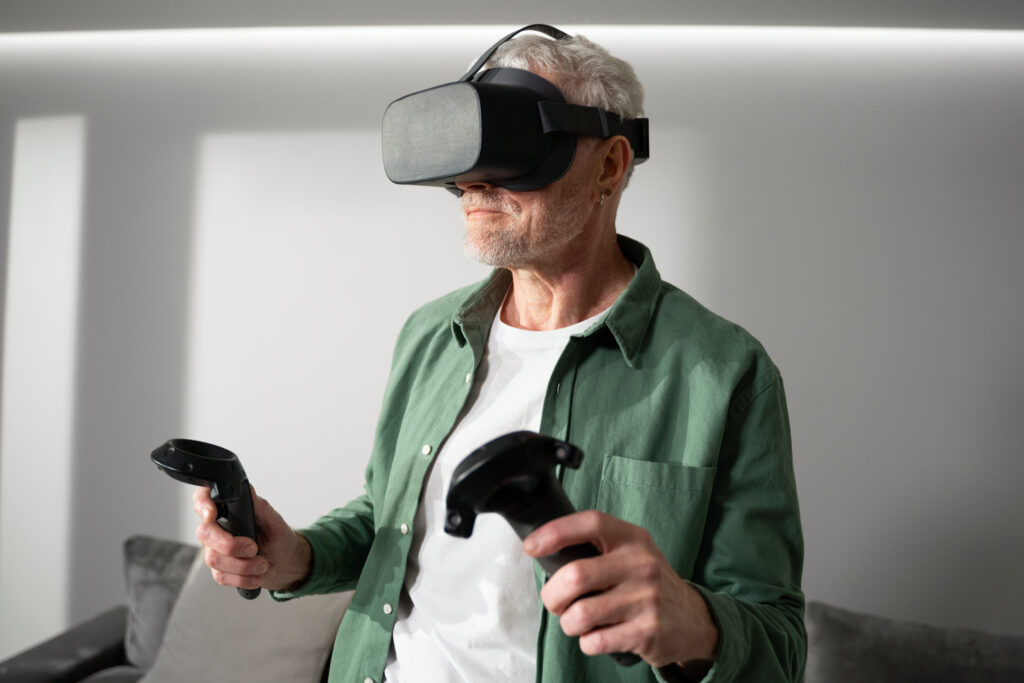Meta’s New VR Headset: A Detailed Analysis of the New Features and the Competition
Introduction
Meta’s New VR Headset: A Game-Changer in Virtual Reality
Virtual Reality (VR) has rapidly evolved in recent years, with Meta (formerly Facebook) playing a key role. The latest launch of Meta’s VR headset continues to set new industry standards. This article offers an in-depth look at its advanced features, comparisons with competitors, and the market impact. If you’re interested in VR technology, this comprehensive overview is for you.
What Makes the New Meta VR Headset Special?
Advanced Features and Technologies
The new Meta VR headset introduces several significant technological advancements:
Ultra-High-Resolution Display
The headset boasts a 4K resolution per eye, delivering crystal-clear image quality. This enhancement reduces the screen-door effect (SDE), often seen in older devices.
Enhanced Motion Tracking
With the latest inside-out tracking technology, movements are captured more accurately. The improved sensors ensure seamless control in the VR environment.
Improved Ergonomics
The headset’s design has been revamped for comfort. The weight has been reduced, and it now features adjustable padding tailored to individual preferences.
Innovative Software Features
The new Meta VR headset also comes with software features that enhance the user experience:
Meta Horizon Workrooms
This virtual collaboration platform allows users to work together in a shared virtual space. It integrates Augmented Reality (AR) elements for seamless collaboration.
Expanded App Library
The platform supports a wide range of applications, including games, educational, and fitness apps. This expansion offers a richer experience for users.
AI-Powered Adjustments
Using Artificial Intelligence (AI), the headset automatically adapts to user habits and optimizes performance for a better experience.
Comparison with Competitors
Meta VR Headset vs. HTC Vive Pro 2
The HTC Vive Pro 2 is a strong competitor in the market. Here’s how it compares with Meta’s new device:
Resolution
Both headsets offer high resolutions. However, the Meta VR headset features 4K per eye, while the HTC Vive Pro 2 offers 5K (2448 x 2448 per eye).
Motion Tracking
While both devices use inside-out tracking, the Meta VR headset has more advanced sensors for greater tracking precision.
Comfort
The Meta headset is often praised for its ergonomic design. In contrast, the HTC Vive Pro 2 is heavier, which might reduce comfort.
Meta VR Headset vs. Oculus Quest 3
Since Meta has also released the Oculus Quest 3, a comparison is essential:
Performance
While the Oculus Quest 3 is known for its all-in-one solution, the new Meta headset offers better computing power and higher image quality.
Features
The new Meta headset introduces advanced AI adjustments and improved motion tracking, which aren’t available in the Oculus Quest 3.
Price
While the Oculus Quest 3 is a cost-effective option, the new Meta VR headset is priced higher, but it offers more advanced technologies.
Conclusion
The latest Meta VR headset sets a new benchmark for VR technology. With its advanced features, including ultra-high resolution, enhanced tracking, and AI-powered adjustments, it provides an exceptional user experience. Compared to its competitors, the headset stands out for its ergonomic design and innovative software features. If you’re serious about VR, this is a device to watch in 2024.
Market Impact and Future Outlook
Impact on the VR Market
The new Meta VR headset has already generated exciting reactions in the market. These technological advancements set a new standard for VR devices and could accelerate the adoption of VR technologies across various sectors. The expanded feature set and improvements over existing products may prompt competitors to innovate, driving the industry forward.
Influence on Competitors
As Meta continues to push boundaries, competitors like HTC and Oculus will likely need to enhance their offerings. This competition benefits consumers, who will enjoy more innovative and accessible VR devices in the near future.
Future Developments
The future of VR technology looks promising. With ongoing developments in AI, AR, and hardware, the next generation of VR headsets is expected to be even more immersive and powerful. The combination of VR and AR could lead to entirely new user experiences, pushing the boundaries of reality and redefining entertainment, education, and workplace productivity.
Immersive Experiences on the Horizon
The merging of virtual reality and augmented reality promises more seamless and immersive experiences. Whether it’s gaming, virtual collaboration, or real-world simulations, these technologies could revolutionize how we interact with digital content.
Conclusion
The new Meta VR headset represents a significant advancement in VR technology. With its advanced features, improved image quality, and innovative software, it offers a compelling package for both enthusiasts and professional users. Comparisons with competitors highlight that Meta remains a leader in the industry, and the future of VR looks incredibly promising.
Stay updated with the latest technology news on getnewupdates.com for further insights and analyses of the newest developments in the field of virtual reality.













